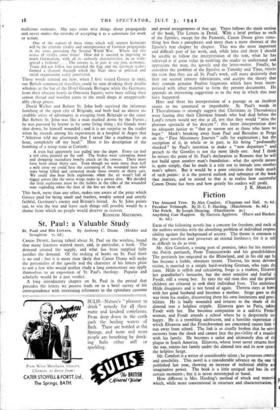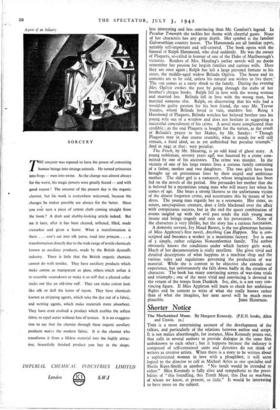Fiction
The Almond Tree. By Alex Comfort. (Chapman and Hall. 75. 6d.) Peculiar Triumph. By D. C. F. Harding. (Hutchinson. 8s. 6d.) The Fetch. By Joseph Shearing. (Hutchinson. 9s.) Anything Can Happen. By Marjorie Appleton. (Hurst and Blacken. 8s. 6d.) EACH of the following novels has a concern for freedom, and each o the authors wrestles with the absorbing problem of individual respon sibility against the background of society. The theme is common t the great novelists and possesses an eternal freshnes..*, for it is stil as difficult to do as ever.
Mr. Alex Comfort, a young poet of promise, takes for his materia the Polish patriarch, Pyotr Tomasczewski and his grandchildren The patriarch has migrated to the Rhineland, and in his old age h has become a feeble, obstinate tyrant. Theresa, his most devote victim, is married to a simple hard-working German, who runs th farm. Hilde is selfish and calculating, Serge is a student, Elisavet her grandfather's favourite, but the most sensitive and fearful Fyodr, still a young boy. In 1910 the old man dies and the grand children are released to seek their individual lives. The ambition Hilde disappears and is not heard of again. Theresa stays at horn with her good husband and becomes a mother. Serge goes to th war from his studies, discovering there his own limitations and possi bilities. He is badly wounded and returns to the shade of th almond tree a helpless cripple. Elisaveta goes to Paris, takin Fyodr with her. She becomes companion to a sadiadc Frenc woman, and Fyodr attends a school where he is desperately un happy. He is a trembling adolescent, and a horrible experience which Elisaveta and the Frenthwoman are concerned causes him t run away from school. The link is so cruelly broken that he nev recovers from the shock and cannot face the pos.■:bility of a remit:, with his family. He becomes a sailor and ultimately dies of th plague in South America. Elisaveta, whose lover never returns fro the war, rejoins her family under the almond tree and its new tyran the helpless Serge.
Mr. Comfort is a writer of considerable talent ; he possesses coura and sensibility. This novel is a considerable advance on the one published last year, showing an increase of technical ability imaginative power. The book is a little unequal and has its u certain moments ; but it is never stereotyped or banal.
How different is Mrs. Harding's method of attack and maten which, while more conventional in structure and characterisation, less interesting and less convincing than Mr. Comfort's legend. In Peculiar Triumph she tackles her theme with cheerful gusto. None of her characters has any great depth. Her symbol is the familiar Galsworthian country house. The Hammonds are all familiar types, suitably self-important and self-centred. The book opens with the funeral of Ralph Hammond, who died suddenly. He was the owner of Plaquets, so-called in honour of one of the Duke of Marlborough's victories. Readers of Mrs. Harding's earlier novels will no doubt remember her passion for largish families and curious wills. Here they are once again ; Ralph has left a large personal fortune to his sister, the middle-aged widow Belinda Ogilvie. The house and its contents are to be sold, unless his natural son wishes to live there." The son comes as a nasty shock to the family. During the evening Mrs. Ogilvie evokes the past by going through the stubs of her brother's cheque books. Ralph fell in love with the wrong woman and married her. Belinda fell in love with the wrong man, but married someone else. Ralph, on discovering that his wife had a would-be guilty passion for his best friend, the sexy Mr. Trevor Sandys, whom Belinda loved in vain, murders her. Being a Hammond of Plaquets, Belinda watches her beloved brother toss his young wife out of a window and does not hesitate in suggesting a successful concealment of his crime. A novel more complicated than credible ; in the end Plaquets is bought for the nation, as the result of Belinda's prayer to her Maker, by Mr. Sandys : "Though Plaquets may in due course crumble, what it stands for will still remain, a fixed ideal, an as yet unfinished but peculiar triumph." And in 1942 at that : very peculiar. The Fetch, by Mr. Shearing, is an odd kind of ghost story. A young nobleman, seventy years agd; was haunted by a crime com- mitted by one of his ancestors. The crime was murder. In the vicinity of one of his large estates lives a curious family consisting of a father, mother and two daughters. The two girls have been brought up on pretentious lines by their stupid and ambitious mother. The elder girl is a romancer, whose imagination has been fed on the novels of the period. She persuades her mother that she is beloved by a mysterious young man who will marry her when he comes of age. She bears a strong likeness to the unfortunate victim of the almost forgotten crime, and accentuates this by means of her dress. The young man regards her as a revenante. Her sister, an astute, unscrupulous creature, does a little blackmail over the affair with conspicuous success, but in the end the queer combination of events tangled up with the evil past sends the rich young man insane and brings tragedy and ruin on his persecutors. None of the characters is very lifelike, but the story has a curious fascination.
A domestic servant, Ivy Maud Barnes, is the too glamorous heroine of Miss Appleton's first novel, Anything Can Happen. She is con- scripted and becomes a worker in a munitions factory. Ivy is one of a simple, rather religious Nonconformist family. The author obviously knows the conditions under which factory girls work. Much of her documentation is really excellent. She gives vivid and detailed descriptions of what happens in a machine shop and the various rules and regulations governing the production of war material. While she is content to be objective she extends our experience, but unfortunately she falls down badly in the creation of character. The book has many convincing scenes of war-time trials and triumphs ; one of the most vivid and convincing is devoted to the return of the troops from Dunkirk. Ivy, alas, is a not very con- vincing figure. If Miss Appleton will learn to check her ambitious flights and be content to write of what she really knows rather than of what she imagines, her next novel will be much more



























 Previous page
Previous page